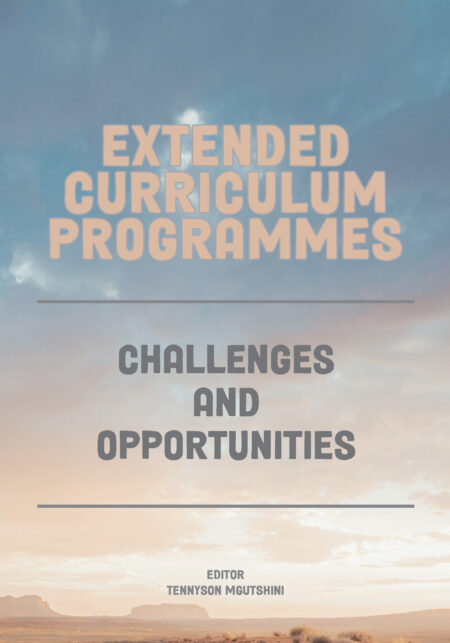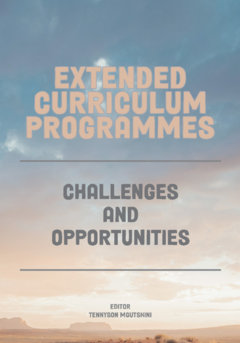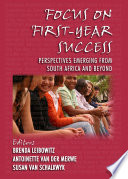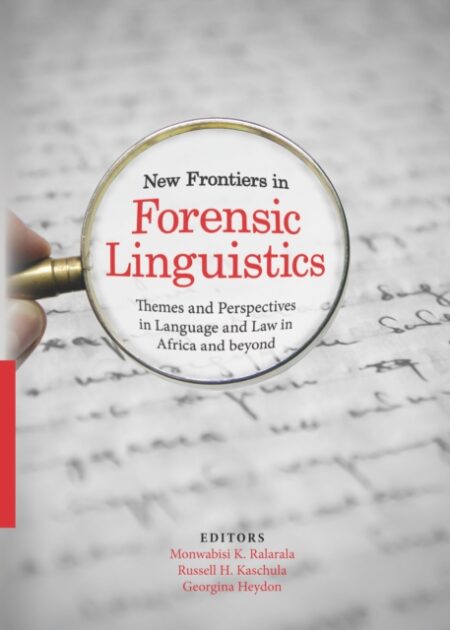-

Engaging Higher Education Curricula
0R0,00The authors aim to stimulate discussion about the nature and purposes of critical citizenship education in higher education. Rather than promoting a blueprint for change, the authors thoughtfully consider a generative research agenda for transformative higher education and focus on how this orientation in higher education plays out on the ground. This book, together with its Coda that takes the conversation beyond critical citizenship education to include responsible citizenship, provides compelling reasons and sound suggestions for a way forward.
Print: View Print Version
-

Engaging Schooling Subjectivities across Post-Apartheid Urban Spaces
0R335,00Aslam Fataar, one of South Africa’s few educational sociologists working with ethnographic methods, captures the complex interactions and dynamics between social life, school processes and youth subjectivity in townships in the Western Cape. His work with concepts of mobilities and space is enormously generative, providing a way for teachers, principals, communities and policy makers to engage with the ?complex ecologies? of young people’s learning in urban schools.
As an astute policy analyst, he also well knows the systemic barriers in the way of achieving this. The last chapter, on possibilities for pedagogical justice at the site of the school, considers how disengaged students might re-engage through leveraging explicit pedagogic connections between their lifeworlds and school practices. Acknowledging that pedagogy cannot be the only means for revitalising schooling, the author nevertheless insists that marginalised young people’s consent needs to be won by schools that make use of, rather than ignore, their strengths, knowledges and aspirations. The approach to the troubled question of youth and subjectivity is enlightening, and vital to understanding the post-apartheid city and school. The book fills a much-needed gap in educational sociology in South Africa.
eBook: View eBook Version
-

Engaging Schooling Subjectivities Across Post-apartheid Urban Spaces
0R0,00Aslam Fataar, one of South Africa’s few educational sociologists working with ethnographic methods, captures the complex interactions and dynamics between social life, school processes and youth subjectivity in townships in the Western Cape. His work with concepts of mobilities and space is enormously generative, providing a way for teachers, principals, communities and policy makers to engage with the ‘complex ecologies’ of young people’s learning in urban schools. As an astute policy analyst, he also well knows the systemic barriers in the way of achieving this. The last chapter, on possibilities for pedagogical justice at the site of the school, considers how disengaged students might re-engage through leveraging explicit pedagogic connections between their lifeworlds and school practices. Acknowledging that pedagogy cannot be the only means for revitalising schooling, the author nevertheless insists that marginalised young people’s consent needs to be won by schools that make use of, rather than ignore, their strengths, knowledges and aspirations. The approach to the troubled question of youth and subjectivity is enlightening, and vital to understanding the post-apartheid city and school. The book fills a much-needed gap in educational sociology in South Africa.
Print: View Print Version
-

Extended Curriculum Programmes
0R350,00The introduction of ECPs in South African Universities is seen by many as South AfricaOs key strategy for addressing the problem of poor patterns of student success and has its basis on the uncontested acceptance that an extended study duration may be necessary to bring some categories of learners to a level of parity with the readiness expectations of their course of study. Even so, this transformative strategic imperative has been plagued by a range of challenges that include poorEsystems readiness; poor selection mechanisms in the identification of ECP students; poor numeracy and literacy amongst students, and indifferent teacher involvement in ECPs. This volume offers a rare insight into many of the above-recognised challenges and in so doing provides critical matter for thought for educators within the higher education sector.
Print: View Print Version
-

Extended Curriculum Programmes
0R280,00The introduction of ECPs in South African Universities is seen by many as South Africa’s key strategy for addressing the problem of poor patterns of student success and has its basis on the uncontested acceptance that an extended study duration may be necessary to bring some categories of learners to a level of parity with the readiness expectations of their course of study. Even so, this transformative strategic imperative has been plagued by a range of challenges that include poor systems readiness; poor selection mechanisms in the identification of ECP students; poor numeracy and literacy amongst students, and indifferent teacher involvement in ECPs. This volume offers a rare insight into many of the above-recognised challenges and in so doing provides critical matter for thought for educators within the higher education sector.
eBook: View eBook Version
-

Focus on First Year Success
0R365,00The importance of the first-year experience is now well recognised. This collection of papers makes a fascinating and important contribution to our understanding of students’ transition to higher education. This is a scholarly, engaging and illuminating text, that is relevant not only in the context of South Africa, but for anyone interested in student learning in the first year of university education. David Gosling, Plymouth University
-

From Hope to Action through Knowledge
0R575,00Its November 2001. A university in dire straits, financially bankrupt burdening a debt in excess of R100-million, a disillusioned and demoralised staff complement still reeling from the trauma of retrenchments, coupled with an academic project facing collapse as student numbers dwindle by a third to less than 10 000. Is there a future for such an institution, described by some as a Obasket caseO with very bleak prospects of survival? This was the landscape that confronted the newly-appointed Vice-Chancellor and Chief Executive Officer (CEO) of the University of the Western Cape.
Fast forward to December 2014. The CEO retires from office, bestowing upon his successor a financially sound institution with a flourishing academic project, recording unprecedented achievements, enriching the lives of more than 20 000 students, and widely acknowledged as a research-led university.E
This book narrates how visionary leadership with the steadfast belief that your past does not determine your future, galvanised an entire organisation into believing that a better outcome was indeed achievable, and the will to move forward as a collective with a redefined purpose and commitment to achieve that which was once deemed impossible.
eBook: View eBook Version
-

From Hope to Action through Knowledge
0R460,00Its November 2001. A university in dire straits, financially bankrupt burdening a debt in excess of R100-million, a disillusioned and demoralised staff complement still reeling from the trauma of retrenchments, coupled with an academic project facing collapse as student numbers dwindle by a third to less than 10 000. Is there a future for such an institution, described by some as a Obasket caseO with very bleak prospects of survival? This was the landscape that confronted the newly-appointed Vice-Chancellor and Chief Executive Officer (CEO) of the University of the Western Cape.
Fast forward to December 2014. The CEO retires from office, bestowing upon his successor a financially sound institution with a flourishing academic project, recording unprecedented achievements, enriching the lives of more than 20 000 students, and widely acknowledged as a research-led university.E
This book narrates how visionary leadership with the steadfast belief that your past does not determine your future, galvanised an entire organisation into believing that a better outcome was indeed achievable, and the will to move forward as a collective with a redefined purpose and commitment to achieve that which was once deemed impossible.
Print: View Print Version
-

Graad R in Perspektief
0R335,00Graad R in Perspektief is ‘n gestruktureerde akademiese gids vir studente, opvoeders en praktisyns in die veld van vroeekindontwikkeling. Dit is saamgestel volgens die Kurrikulum- en Assesseringsbeleidsverklaring (KABV) van die Nasionale Onderwysdepartement 2011 en toon die jongste tendense van internasionale bronne. Die fokus le op die voorbereiding van die student om die beginsels van die informele onderrigbenadering te verstaan en dit te implementeer. Duidelike voorskrifte word gegee om kennis, vaardighede en houdings by die jong kind te ontwikkel sodat elke leerder selfverwesenliking kan bereik. Inligting word voorsien oor die inrigting van die klaskamer en speelomgewing om vir leerders optimale leergeleenthede te skep. Leerders se verskillende ontwikkelingsvlakke en kulture word in ag geneem. Wenke vir onderrig in die praktyk word toegelig met toepaslike voorbeelde en foto’s.
Print: View Print Version
-

Graad R in Perspektief
0R415,00Graad R in Perspektief is ‘n gestruktureerde akademiese gids vir studente, opvoeders en praktisyns in die veld van vroeakindontwikkeling. Dit is saamgestel volgens die Kurrikulum- en Assesseringsbeleidsverklaring (KABV) van die Nasionale Onderwysdepartement 2011 en toon die jongste tendense van internasionale bronne. Die fokus lo op die voorbereiding van die student om die beginsels van die informele onderrigbenadering te verstaan en dit te implementeer. Duidelike voorskrifte word gegee om kennis, vaardighede en houdings by die jong kind te ontwikkel sodat elke leerder selfverwesenliking kan bereik. Inligting word voorsien oor die inrigting van die klaskamer en speelomgewing om vir leerders optimale leergeleenthede te skep. Leerders se verskillende ontwikkelingsvlakke en kulture word in ag geneem. Wenke vir onderrig in die praktyk word toegelig met toepaslike voorbeelde en foto’s.
eBook: View eBook Version
-

Grade R in Perspective
0R335,00Grade R in Perspective is a structured academic guide for students, educators and practitioners in the field of early child development. It is compiled according to the Curriculum and Assessment Policy Declaration (CAPS) of the National Department of Education 2011 and presents the latest tendencies of international sources. The focus is put on preparing the student to understand the principles of the informal teaching approach and to implement them. Clear directions are given to develop knowledge, skills and attitudes in the young child so that each learner can achieve self-realisation. Information is given on organising the classroom and the play area to create optimal learning opportunities for the learners. The different levels of development and cultures of the learners are taken into consideration. Valuable suggestions for teaching in practice are illustrated with appropriate examples and photos.
Print: View Print Version
-

Grade R in Perspective
0R415,00Grade R in Perspective is a structured academic guide for students, educators and practitioners in the field of early child development. It is compiled according to the Curriculum and Assessment Policy Declaration (CAPS) of the National Department of Education 2011 and presents the latest tendencies of international sources. The focus is put on preparing the student to understand the principles of the informal teaching approach and to implement them. Clear directions are given to develop knowledge, skills and attitudes in the young child so that each learner can achieve self-realisation. Information is given on organising the classroom and the play area to create optimal learning opportunities for the learners. The different levels of development and cultures of the learners are taken into consideration. Valuable suggestions for teaching in practice are illustrated with appropriate examples and photos.
eBook: View eBook Version


